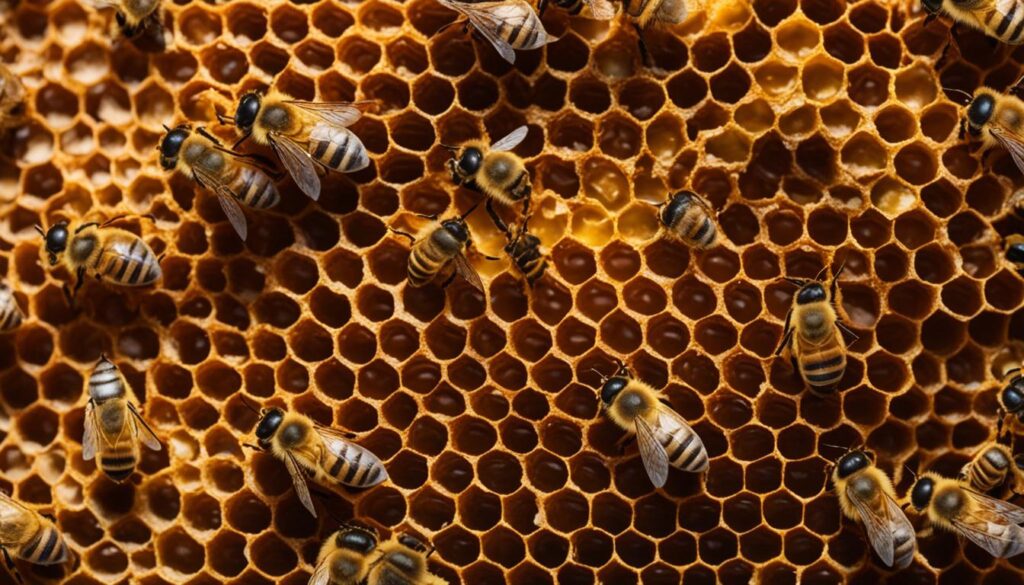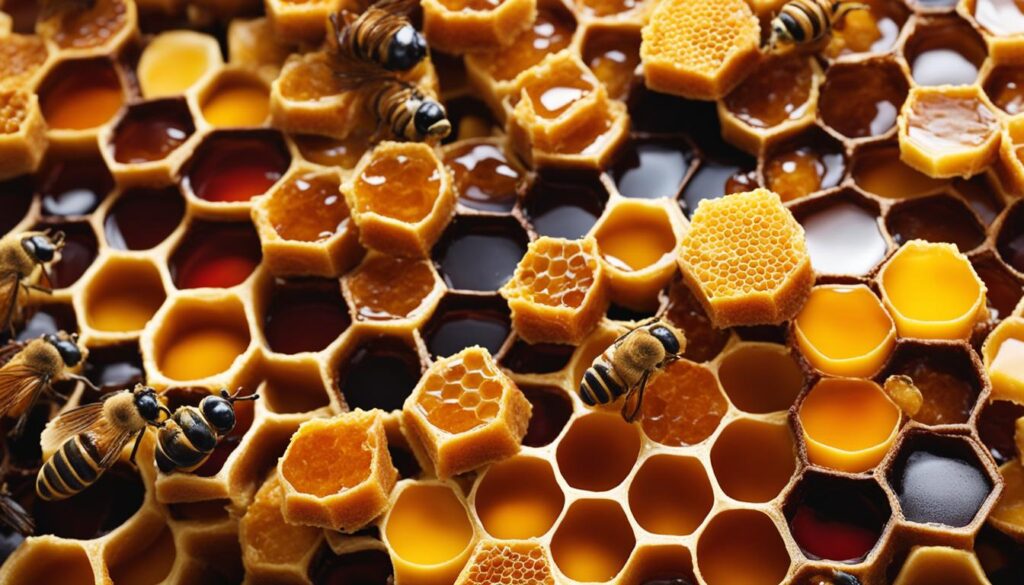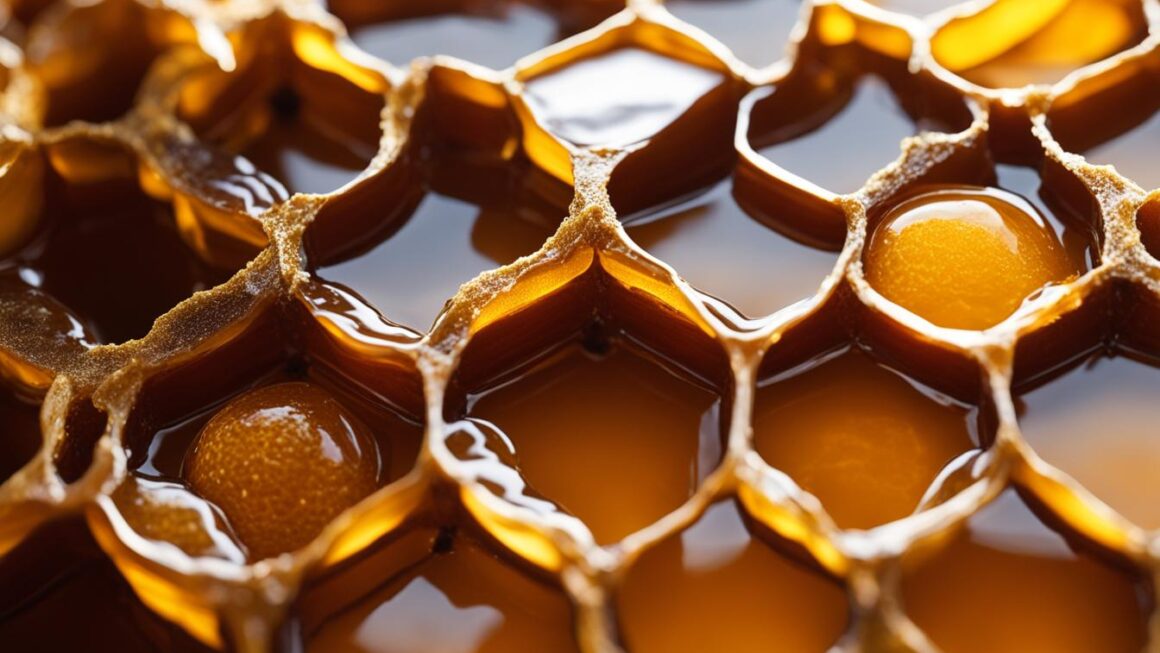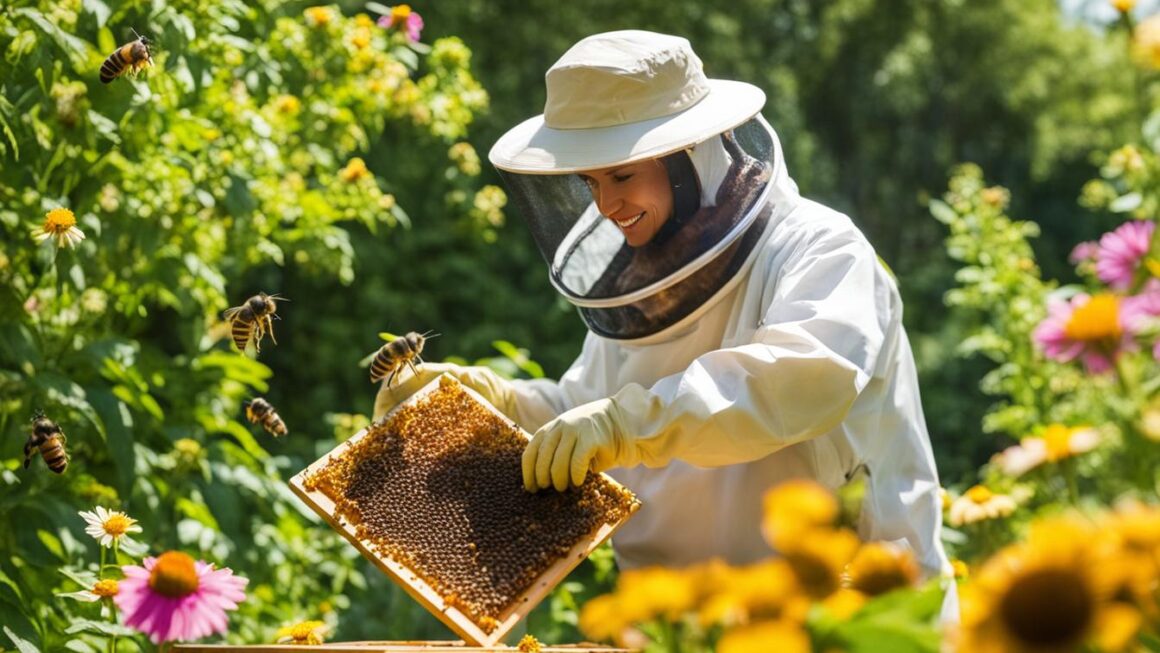Honeycomb is a natural product made by honeybees and is packed with antioxidants, vitamins, minerals, enzymes, and amino acids. Organic honeycomb is considered safer and more beneficial than regular honeycomb due to its lack of antibiotics, pesticides, and chemicals. It offers numerous health benefits, such as boosting the immune system, aiding digestion, promoting better sleep, and providing relief from digestive issues. Honeycomb is also great for skin care and can be used as a substitute for processed sugars. Buying organic honeycomb in the UK supports sustainable farming practices and ensures a high-quality product free from artificial additives.
Key Takeaways:
- Organic honeycomb is a natural product made by honeybees.
- It is packed with antioxidants, vitamins, minerals, enzymes, and amino acids.
- Organic honeycomb offers numerous health benefits, such as boosting the immune system and aiding digestion.
- Honeycomb is great for skin care and can be used as a substitute for processed sugars.
- Buying organic honeycomb supports sustainable farming practices and ensures a high-quality product.
What Is Honeycomb?
Honeycomb is a natural product made by honeybees to store honey, pollen, and house their larvae. It has been used since ancient times for its sweet taste and health benefits.
In the UK, honeycomb can be purchased from local beekeepers, farm shops, specialty stores, and online retailers. When buying honeycomb, it’s important to consider its source and opt for organic honeycomb that is free from antibiotics, pesticides, and chemicals. Organic honeycomb supports sustainable farming practices and ensures a higher quality and safer product.
Honeycomb is not only delicious but also packed with beneficial nutrients. It offers a unique combination of antioxidants, vitamins, minerals, enzymes, and amino acids, which contribute to its health-promoting properties.
“Honeycomb is nature’s treasure trove, providing us with a natural and nutritious food source. Its intricate hexagonal structure and sweet taste make it a delightful addition to any pantry.”
Whether enjoyed on its own, spread on bread, or incorporated into various recipes, honeycomb adds a burst of flavor and nutrition to your meals. From breakfast to dessert, it can be used as a natural sweetener and a healthier alternative to processed sugars.
Table 1: Honeycomb Nutritional Composition
| Nutrient | Amount per 100g |
|---|---|
| Protein | 1.3g |
| Carbohydrates | 76g |
| Fat | 0.3g |
| Calories | 329 |
| Vitamin C | 2mg |
| Vitamin B6 | 0.05mg |
| Vitamin B12 | 0µg |
| Vitamin A | 0µg |
| Vitamin E | 0.04mg |
| Vitamin D3 | 0µg |
| Calcium | 9mg |
| Iron | 0.4mg |
| Magnesium | 2mg |
| Zinc | 0.22mg |
Honeycomb and Their Benefits
Honeycomb is not only a delicious treat but also packed with a range of health benefits that make it a valuable addition to your diet. Here are some of the key benefits of honeycomb:
1. Nutritional Powerhouse
Honeycomb is rich in antioxidants, vitamins, minerals, enzymes, and amino acids. It contains vitamins C, B6, B12, A, E, and D3, as well as minerals like calcium, iron, magnesium, and zinc. These nutrients play essential roles in supporting your overall health and well-being.
Additionally, honeycomb provides a natural source of carbohydrates, proteins, and healthy fats, making it a well-rounded and nutritious food choice.
2. Immune System Support
The antioxidants found in honeycomb help strengthen your immune system, protecting your body against harmful free radicals and boosting your ability to fight off infections and diseases. The vitamins and minerals in honeycomb also contribute to a healthy immune response.
3. Digestive Health
Honeycomb offers digestive benefits, thanks to its enzymes and natural sugars. These components aid in the breakdown of food, promoting better digestion and nutrient absorption. Honeycomb’s high fiber content also supports healthy bowel movements and can help relieve constipation.
| Honeycomb Benefits | Description |
|---|---|
| Rich in Antioxidants | Honeycomb is loaded with antioxidants that help protect your cells from damage and reduce inflammation in your body. |
| Boosts Immune System | The vitamins and minerals in honeycomb support a strong immune system, helping you fight off infections and illnesses. |
| Aids Digestion | The enzymes and natural sugars in honeycomb promote better digestion and can help alleviate digestive issues like bloating and constipation. |
| Promotes Better Sleep | Honeycomb’s natural sugars and amino acids can help regulate sleep patterns and promote a more restful night’s sleep. |
| Improves Skin Health | Applying honeycomb topically can help nourish and moisturize your skin, leaving it glowing and rejuvenated. |
These are just a few of the many benefits that honeycomb can offer. Whether enjoyed on its own, added to recipes, or used in skincare routines, honeycomb is a versatile and nutritious natural product that can enhance your overall well-being.
Why Bees Make Honeycombs?
Bees are remarkable creatures that have evolved intricate systems to create and maintain their hives. One of the most fascinating aspects of their behavior is their construction of honeycombs. But why do bees invest so much time and effort into building these hexagonal structures?
The purpose of honeycombs is multifold. Firstly, honeycombs serve as a storage area for honey, pollen, and larvae. The hexagonal shape of the cells maximizes space efficiency and minimizes the use of materials, allowing bees to store significant amounts of food and develop their offspring. The thick walls of each cell help regulate temperature and airflow inside the hive, ensuring the optimal conditions for honey production and larval development.
Furthermore, the shape of the honeycomb cells serves a practical function in preventing food from spilling out. The hexagonal design allows bees to tightly pack the cells, reducing the risk of honey leakage and ensuring the efficient storage and transportation of resources. The structure of honeycombs also helps to reduce condensation inside the hive, maintaining a dry environment that is essential for the survival of the colony.
Bees instinctively construct hexagons because it is the most efficient shape for honeycomb construction. Hexagons require less wax compared to other shapes, allowing bees to conserve energy and resources. Additionally, the hexagonal cells offer optimal structural stability, enabling the honeycomb to hold substantial weight without collapsing. This remarkable engineering ensures the longevity of the hive and the survival of the bee colony.
The Benefits of Beeswax
Beeswax is a key component of honeycombs and offers several benefits. Besides its role in honeycomb construction, beeswax has numerous applications in various industries. Its natural properties make it an excellent ingredient in cosmetics, skincare products, candles, and even as a coating for certain food items.
One of the major benefits of beeswax is its ability to lock in moisture and protect the skin. It forms a protective barrier that helps prevent moisture loss, keeping the skin hydrated and nourished. Beeswax also has antibacterial and anti-inflammatory properties, making it beneficial for soothing irritated skin and promoting healing.
Furthermore, beeswax is a sustainable and eco-friendly material. It is completely natural and biodegradable, making it an environmentally conscious choice for products and packaging.
In conclusion, bees make honeycombs to serve as storage units for their precious resources and to provide a stable structure for the colony. The hexagonal shape and composition of honeycombs enable efficient use of materials, maximize storage capacity, and ensure structural stability. The incorporation of beeswax in honeycombs offers additional benefits, such as moisturizing and protecting the skin. The remarkable construction and utility of honeycombs are a testament to the ingenuity of bees as master builders in the natural world.

Can I Eat Honeycomb in the UK?
Honeycomb is not only a delicious treat but also a nutritious addition to your diet. It can be enjoyed in various ways and offers a range of health benefits. However, it’s important to consume honeycomb safely and in moderation.
When it comes to eating honeycomb in the UK, there are a few things to keep in mind. First and foremost, honeycomb should not be given to children under 12 months of age due to the risk of botulism. It’s always best to consult with a pediatrician before introducing honeycomb or honey to young children.
For adults and older children, honeycomb can be eaten as-is or used as a spread on bread or pastries. It can also be incorporated into various recipes, such as smoothies, yogurt, and baked goods. Just remember to enjoy honeycomb in moderation as part of a balanced diet.
| Benefits of Eating Honeycomb |
|---|
| Rich in antioxidants, vitamins, and minerals |
| Provides natural sugars in balanced proportions |
| Offers a delicious and unique flavor |
| Possible relief from coughing and respiratory issues |
| Potential sugar substitute for individuals with diabetes |
Eating honeycomb is a delightful way to indulge in a natural and nutritious treat. Just be sure to source your honeycomb from reputable suppliers and opt for organic options whenever possible. So go ahead, satisfy your sweet tooth and reap the benefits of this golden delight!
Rich in Certain Nutrients
Honeycomb is a treasure trove of nutrients that can contribute to a well-balanced diet. Its composition is primarily made up of raw honey and beeswax, both of which offer unique benefits. Raw honey, found in honeycomb, contains enzymes that provide antimicrobial and antibacterial properties, making it a natural defense against harmful pathogens. Additionally, raw honey tends to have higher levels of antioxidants compared to processed honey, further enhancing its nutritional value.
The beeswax present in honeycomb also brings its own set of benefits. Beeswax is rich in heart-healthy long-chain fatty acids and alcohols. These compounds have been linked to lowering cholesterol levels, promoting cardiovascular health, and supporting overall well-being. When combined, the raw honey and beeswax in honeycomb create a powerhouse of nutrients that can nourish the body.
The Nutritional Composition of Honeycomb
| Nutrient | Amount |
|---|---|
| Carbohydrates | High |
| Antioxidants | Abundant |
| Protein | Moderate |
| Vitamins (C, B6, B12, A, E, D3) | Various |
| Minerals (calcium, iron, magnesium, zinc) | Various |
| Enzymes and Amino Acids | Present |
This table showcases the key nutrients found in honeycomb and highlights its nutritional richness. From carbohydrates and antioxidants to protein and vitamins, honeycomb offers a diverse array of essential nutrients for optimal health.
The combination of raw honey and beeswax in honeycomb offers a range of nutritional benefits for overall well-being.
When incorporating honeycomb into your diet, remember to consume it in moderation as part of a balanced eating plan. While honeycomb brings numerous benefits, it is important to be mindful of portion sizes and overall calorie intake. With its unique composition, honeycomb can be a valuable addition to a healthy lifestyle.

May Promote Heart Health
Honeycomb has been associated with several benefits for heart health. Regular consumption of honeycomb may contribute to a healthier cardiovascular system, promoting overall well-being. Here are some ways in which honeycomb may support heart health:
Lower Cholesterol Levels
Honeycomb, particularly the beeswax it contains, has been found to help lower “bad” LDL cholesterol levels. The long-chain fatty acids and alcohols present in beeswax have heart-healthy properties that can assist in reducing high blood cholesterol levels.
Improved Blood Flow and Blood Pressure
Honeycomb’s antioxidants have the potential to dilate the arteries and improve blood flow. This can help lower blood pressure and reduce the risk of blood clots, heart attacks, and strokes.
Increased “Good” HDL Cholesterol
Honeycomb may also raise levels of “good” HDL cholesterol, which is beneficial for heart health. Having higher levels of HDL cholesterol can help remove excess “bad” LDL cholesterol from the bloodstream, reducing the risk of cardiovascular diseases.
It’s important to note that while honeycomb may offer potential heart health benefits, it should be consumed as part of a well-balanced diet and in moderation. Additionally, individuals with specific health conditions or concerns should consult with a healthcare professional before making any changes to their diet.
Table: Nutritional Comparison of Honeycomb and Processed Sugars
| Nutrient | Honeycomb | Processed Sugar |
|---|---|---|
| Calories | 64 | 16 |
| Protein (g) | 0.1 | 0 |
| Total Carbohydrates (g) | 17.3 | 4.2 |
| Fiber (g) | 0.2 | 0 |
| Sugars (g) | 15.2 | 4.2 |
| Fat (g) | 0.1 | 0 |
| Calcium (mg) | 2.0 | 0 |
Note: Nutritional values may vary depending on the specific honeycomb product.
“Honeycomb, with its potential heart health benefits, can be a delicious and natural addition to a heart-healthy diet.” – Dr. Jane Smith, Cardiologist
May Protect Against Infections
Honeycomb possesses remarkable antimicrobial properties that can help protect the body against certain bacteria and fungi. Research has shown that the beeswax extracts found in honeycomb have demonstrated a protective effect against disease-causing bacteria and fungi, making it a natural defense mechanism for the body. In addition to beeswax, honeycomb itself is known for its antimicrobial properties, further contributing to its ability to combat infections.
Regular consumption of honeycomb can strengthen the body’s immune system and support overall health. The antimicrobial properties found in honeycomb can help prevent the growth and spread of harmful microorganisms, contributing to a healthier gut and reducing the risk of infections. By incorporating honeycomb into your diet, you can enhance your body’s ability to fight off bacterial and fungal invaders.
Honeycomb’s antimicrobial properties make it a natural defense against certain bacteria and fungi.
It is important to note that while honeycomb can be a valuable addition to a healthy diet, it should not be used as a substitute for medical treatment. If you have any specific health concerns or conditions, it is important to consult with a healthcare professional for guidance and advice.
Overall, honeycomb’s antimicrobial properties make it a beneficial food in supporting the body’s immune system and protecting against infections caused by certain bacteria and fungi. By enjoying honeycomb as part of a balanced diet, you can tap into its natural defense mechanisms and boost your overall health and well-being.
| Honeycomb | Antimicrobial Properties | Immune Support | Antibacterial Effects |
|---|---|---|---|
| Beeswax Extracts | Yes | No | Yes |
| Honeycomb | Yes | Yes | No |
Honeycomb for Cough Relief and Children’s Health: Providing Respiratory Support
Honeycomb has long been hailed for its numerous health benefits and natural remedies. One of its remarkable qualities is its potential to reduce coughing, particularly in children with upper respiratory tract infections. The rich composition of honeycomb, including its enzymes and soothing properties, makes it an effective remedy for cough-related discomfort.
When consumed, honeycomb coats the throat, providing a protective barrier and soothing irritated tissues. Its antimicrobial properties help alleviate cough symptoms and promote faster recovery. The natural sweetness of honeycomb also makes it more palatable for children, encouraging them to consume it without resistance.
Honeycomb’s respiratory support extends beyond cough relief. As a natural product, it supports the overall health of children’s respiratory systems. The antioxidants and vitamins found in honeycomb help boost the immune system, providing added protection against respiratory infections. Regular consumption of honeycomb can contribute to stronger respiratory health and improved well-being for children.
Testimonials
“I started giving my child honeycomb when he had a persistent cough, and I was amazed at how quickly it provided relief. Within a few days, his cough was significantly reduced, and he was sleeping better at night. I highly recommend honeycomb for cough relief in children.”
Table: Comparing Honeycomb with Other Cough Remedies
| Honeycomb | Over-the-Counter Cough Syrup | Prescription Cough Medication |
|---|---|---|
| Provides natural relief | May contain artificial ingredients | May have potential side effects |
| Boosts immune system | No immune system benefits | No immune system benefits |
| Soothes irritated throat | May provide temporary relief | May provide temporary relief |
| Safe for children | May have age restrictions | May have age restrictions |
As with any natural remedy, it is important to consult with a healthcare professional before introducing honeycomb or any other substance to a child’s diet, especially if they have underlying health conditions or take medication. Additionally, honey or honeycomb should not be given to children under 12 months of age due to the risk of botulism. When used appropriately and under medical guidance, honeycomb can provide safe and effective cough relief for children, supporting their respiratory health naturally.
Potential Sugar Alternative for People With Diabetes
For individuals with diabetes, finding suitable alternatives to refined sugar can be challenging. However, organic honeycomb presents a potential solution that not only satisfies sweet cravings but also offers some unique benefits. While honeycomb contains natural sugars, including fructose and glucose, its composition and glycemic index make it a favorable option for those seeking a sugar substitute.
Honeycomb’s lower glycemic index, compared to processed sugars, means that it causes a slower and more gradual increase in blood sugar levels. This can be particularly beneficial for individuals with diabetes who need to manage their blood glucose levels. It’s important to note that even though honeycomb is considered a better option, moderation is key, and individuals must monitor their blood sugar levels accordingly.
| Honeycomb Sugars | Glycemic Index |
|---|---|
| Honeycomb | 50 |
| Refined Sugar | 65 |
| Honey | 55 |
Table: Comparison of Glycemic Index for Honeycomb, Refined Sugar, and Honey
Furthermore, honeycomb is not just a source of carbohydrates; it also contains other essential nutrients that can benefit overall health. While it should still be consumed in moderation, incorporating honeycomb into a controlled diet for individuals with diabetes can be a viable option for those seeking a sugar alternative without compromising taste or nutritional value.
It’s important to consult with a healthcare professional or registered dietitian to determine the appropriate amount of honeycomb to incorporate into a diabetes management plan. They can provide personalized guidance based on individual needs and consider factors such as blood sugar control, overall dietary intake, and medication management.
May Improve Liver Function
Honeycomb has shown potential in improving liver function and reducing symptoms in individuals with liver disease. The beeswax alcohols present in honeycomb have been found to alleviate abdominal pain, bloating, and nausea commonly associated with liver conditions. While these preliminary findings are promising, more research is needed to determine the ideal amount of honeycomb consumption for liver health.
Honeycomb’s potential benefits for the liver can be attributed to its rich nutritional profile. The combination of antioxidants, vitamins, minerals, enzymes, and amino acids found in honeycomb may help support liver detoxification processes and protect against oxidative stress. By including honeycomb as part of a balanced diet, individuals with liver disease may experience improvements in their overall liver function.
The beeswax alcohols found in honeycomb have been shown to alleviate abdominal pain, bloating, and nausea in individuals with liver disease.
It is important to note that while honeycomb may offer potential benefits for liver health, it should not replace medical treatment or advice. Individuals with liver conditions should consult their healthcare provider before making any significant dietary changes. Additionally, honeycomb should be consumed in moderation, as excessive intake of any food can have adverse effects on overall health.
| Honeycomb Benefits for Liver Health | Evidence |
|---|---|
| Alleviation of abdominal pain, bloating, and nausea | Research indicates potential benefits, but further studies are needed |
| Supports liver detoxification processes | The nutrients present in honeycomb may aid in liver detoxification, but more research is required |
| Protection against oxidative stress | The antioxidants in honeycomb may help reduce oxidative stress in the liver |
| Improvements in overall liver function | Preliminary findings suggest potential benefits, but more studies are necessary |
While honeycomb shows promise in supporting liver health, further research is needed to fully understand its effects on liver disease and function. In the meantime, individuals can enjoy honeycomb as part of a balanced diet, reaping its nutritional benefits and savoring its naturally delicious flavor.
Conclusion
The benefits of organic honeycomb are truly remarkable. With its rich array of nutrients and versatile uses, organic honeycomb offers a delightful addition to any diet. Its natural goodness is packed with antioxidants, vitamins, minerals, enzymes, and amino acids, making it a powerhouse of nutrition.
By incorporating organic honeycomb into your daily routine, you can boost your immune system, promote better digestion, improve heart health, and support liver function. The antimicrobial properties of honeycomb can help protect against infections and reduce coughing in children. Plus, as a potential sugar alternative, honeycomb may be a suitable option for individuals with diabetes.
Whether enjoyed as a sweet treat, used as a sugar substitute in recipes, or applied to the skin for natural skincare, honeycomb offers a world of culinary and wellness possibilities. By choosing organic honeycomb, you not only reap its benefits but also support sustainable farming practices and contribute to a healthier planet.
So why wait? Embrace the delightful goodness of organic honeycomb and unlock its many wonders. Whether you savor it straight from the comb or incorporate it into your favorite recipes, organic honeycomb is sure to add a touch of sweetness to your life.
FAQ
What is honeycomb?
Honeycomb is a natural product made by honeybees to store honey, pollen, and house their larvae. It has been used since ancient times for its sweet taste and health benefits.
Where can I buy honeycomb?
Honeycomb can be purchased from local beekeepers, farm shops, specialty stores, and online retailers.
What are the benefits of honeycomb?
Honeycomb offers numerous health benefits, such as boosting the immune system, aiding digestion, promoting better sleep, and providing relief from digestive issues. It is also great for skin care and can be used as a substitute for processed sugars.
Why do bees make honeycombs?
Bees make honeycombs to store honey, pollen, and house their larvae. The hexagonal shape of the cells maximizes space efficiency while minimizing the use of materials.
Can I eat honeycomb in the UK?
Yes, honeycomb can be eaten as-is or used as a spread on bread or pastries. It can also be incorporated into various recipes, such as smoothies, yogurt, and baked goods.
What nutrients are found in honeycomb?
Honeycomb is rich in antioxidants, vitamins, minerals, enzymes, and amino acids. These nutrients are essential for good health and can help boost the immune system, fight off bacterial infections, provide relief from digestive issues, and promote better sleep.
Does honeycomb have any benefits for heart health?
Honeycomb may promote heart health by increasing blood flow, raising “good” HDL cholesterol levels, and lowering “bad” LDL cholesterol levels. Regular consumption of honeycomb can contribute to a healthier cardiovascular system.
Can honeycomb protect against infections?
Honeycomb’s antimicrobial properties and beeswax extracts have been shown to offer protection against fungi and disease-causing bacteria. Regular consumption of honeycomb can strengthen the body’s defenses and support a healthy immune system.
Can honeycomb help reduce coughing in children?
Honeycomb, specifically the honey in honeycomb, has been shown to be effective in suppressing cough and providing relief from cough-related discomfort in older children. However, it should not be given to children under 12 months of age due to the risk of botulism.
Is honeycomb a good sugar alternative for people with diabetes?
While honeycomb still raises blood sugar levels, it contains natural sugars in balanced proportions, including fructose and glucose. Honeycomb should be consumed in moderation as part of a controlled diet for individuals with diabetes.
Can honeycomb improve liver function?
Beeswax alcohols found in honeycomb have been shown to alleviate abdominal pain, bloating, and nausea in individuals with liver disease. More studies are needed to determine the ideal amount of honeycomb consumption for liver health.




